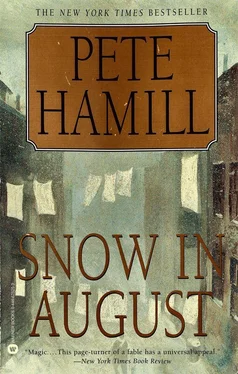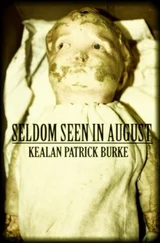“It was, how do you say? A great love,” he said, groping for words, but surprisingly — to Michael — not embarrassed. “For me, there was no mystery why I love her. She was good. Beautiful. She have, had, what I don’t have, that passion . Still I don’t know why she love me, a poor rabbi, who didn’t believe what she believed.”
“Nobody has answers to such questions, Rabbi,” Kate Devlin said.
“No. We don’t never know.” He paused. “But there was one thing we could not to do. I saw her, I heared her, I loved her, my Leah. But I have in my head this one thing: to dance with her. Before I am a rabbi student, I love to dance. I love the cabaret, the music. I love when on the radio from Vienna we hear Strauss, a waltz. I love the jazz we hear too, Bix Beiderbecke? Paul Whiteman.… So I want to go with her to some place, not in rabbi clothes, some place with music and laughing and no worry about time and Hitler. Just to dance. Just that. To dance with Leah Yaretzky, to dance with my woman I love.”
Kate Devlin’s eyes watered. She sipped her wine.
“Could you waltz?” Michael asked, picturing his father at the Webster Hall.
“Of course, boychik! We are only a day from Vienna, the world champion of the waltzes.”
Judah Hirsch and Leah Yaretsky never found time to waltz. And Michael pictured the rabbi at a newsstand in Prague, reading that Hitler’s troops were moving into the Saar. He saw him rushing about with Leah to meetings, dodging spies and informers. He was with Rabbi Hirsch on the steps of the synagogue as frightened Jews arrived in Prague from a place called the Sudetenland, to sleep on floors or in wagons, and together they heard Hitler ranting on the radio that the Sudetenland was German. Everybody wanted visas to America, like Ingrid Bergman in that movie Casablanca . But Michael heard them saying that the Americans didn’t want any more Jews. And wondered if this was because in America there were also people who painted swastikas on synagogues.
Then there was a meeting of all the Jewish leaders in Prague. Michael listened as some of them said that they had survived all sorts of Jew-haters, all the way back to Brother Thaddeus; they would survive Hitler too. Besides, the major powers, England and France, they wouldn’t allow this clown Hitler to have his way. And Hitler wouldn’t risk a world war over such a small country.
“On some days, even I believed this stupidness,” Rabbi Hirsch said. “Only Leah refused to believe any of it.”
Now Michael was watching newsreels with Rabbi Hirsch and Leah, in a dark, smoky theater in Prague, seeing Hitler taking over Austria, then watching a guy from England in striped pants standing beside a Frenchman in the city of Munich, saying that Hitler could have the Sudetenland. Everybody in the movie house was silent, except Leah. “Cowards,” she was yelling. “Fascist bastards!” Now she was smoking furiously. Now she was sleeping on desks in grubby offices. Now she was jittery and irritated. Now she was losing weight. Michael saw her going away, two days here, three days there, to make speeches, to raise money, and there was Rabbi Hirsch, alone. Michael helped him pack his most precious books for shipment to an address in Palestine. He walked with him past a dance hall where the orchestra played and nobody danced at all.
He imagined the rabbi alone at night in his synagogue. Praying to God to deal with Hitler. Praying that the Jews would be saved. Above all, praying for Leah Yaretzky.
“You were married by then?” Kate Devlin said.
“Yes,” he said. “On March 7th, 1939. But a very small ceremony. No party, no joy. We did not dance. She said such things — dancing, lakhn , uh, laughing — they are wrong when Jews are in danger. She said when together we are all safe in Israel, we will have a great party and dance for a week.”
Then it was the day after their wedding. As Rabbi Hirsch spoke, Michael could see him at the door, as Leah said goodbye. She had to go to Lublin in Poland for five days of urgent meetings, and now she was asking Rabbi Hirsch to make a brief trip to Austria to deliver a package. They would meet again in Prague and then leave together for the south. To make their way to Palestine.
He saw Rabbi Hirsch arguing with her. This is foolish, he was saying. The Nazis are in power in Vienna. And Hitler is moving troops on the Czech borders. Open your nose, he was saying to Leah. You can smell death. And in such a time, he tells her, I want to be with my wife.
But Leah insisted. Rabbi Hirsch would go by car through the mountains to a certain hamlet. He would be met at a certain place by a certain man, would turn over a thick envelope, and then retrace his steps, back to Prague.
“I say, ‘Leah, even a donkey takes one look at me and knows I am a rabbi.’ She says, ‘Not if your beard you shave off. Not if your clothes you change. Please,’ she says to me, ‘on this envelope, the money inside, depends hundreds of lives.’”
He paused. Michael leaned forward, his head full of James Cagney in 13 Rue Madeleine .
“What did you do?” he asked.
“My beard I shaved,” he said. “My clothes I changed.” He paused. “We say goodbye. A joke she makes that with my shaved face and clothes from the university, she feels she’s kissing another man. I kiss her again and say when we are safe, I never shave again.”
And then Michael joined the beardless Rabbi Hirsch in a car driven by a blond Jew who spoke German. Racing through backroads, climbing into mountains, plunging into forests, until at last they reached a hunter’s cabin. Two members of the underground were waiting, holding machine guns. Rabbi Hirsch turned over the package of money. The driver went on alone, to Vienna, and when he was gone, Rabbi Hirsch learned Hitler had marched into Czechoslovakia. Not a shot had been fired. The Wehrmacht was in Prague. The Nazis were securing the borders, including the border with Poland. And Leah Yaretzky was across that border, in Poland.
Now Michael could see Rabbi Hirsch turn and walk straight into the forest. Saw him as he walked and walked, avoiding the main roads, sleeping under bridges and in train stations and even in a chair in a public library. He walked with Rabbi Hirsch as they crossed together into Czechoslovakia and then saw thousands of German troops moving in trucks on main roads. Billowing in the wind were those scary black-and-red flags adorned with swastikas.
Then at last, Rabbi Hirsch was in Prague. He called the apartment across the street from the synagogue, the small flat where he was to live with Leah Yaretzky. Nobody answered. He saw men in black Gestapo uniforms driving around in polished black cars. An old man told him that some Jews had already been arrested, their names on Gestapo lists. He went to the post office, which was guarded by men in SS uniforms, but was told that nobody could place calls to Poland. From a café on Wenceslas Square, he called some other members of Leah’s network. Nobody answered the first three calls and a German voice answered the fourth. The network had vanished, and so had Leah.
He finally risked going to the apartment. There were no Germans to be seen. A sign on the door of the synagogue across the street said that it was closed, but there were no guards posted on the steps. In the apartment, he packed a small canvas bag with pictures of Leah and his father, along with clothes and his basic documents. He burned the Zionist literature. Then he made two final packages of books, carried them to the synagogue, entered through a side door, and placed them in a storeroom in the basement. He rolled the Torah scroll and took it to the home of Mr. Fishbach, the beadle, who left immediately for the mountains, where the scroll would be hidden from the Germans.
Читать дальше












